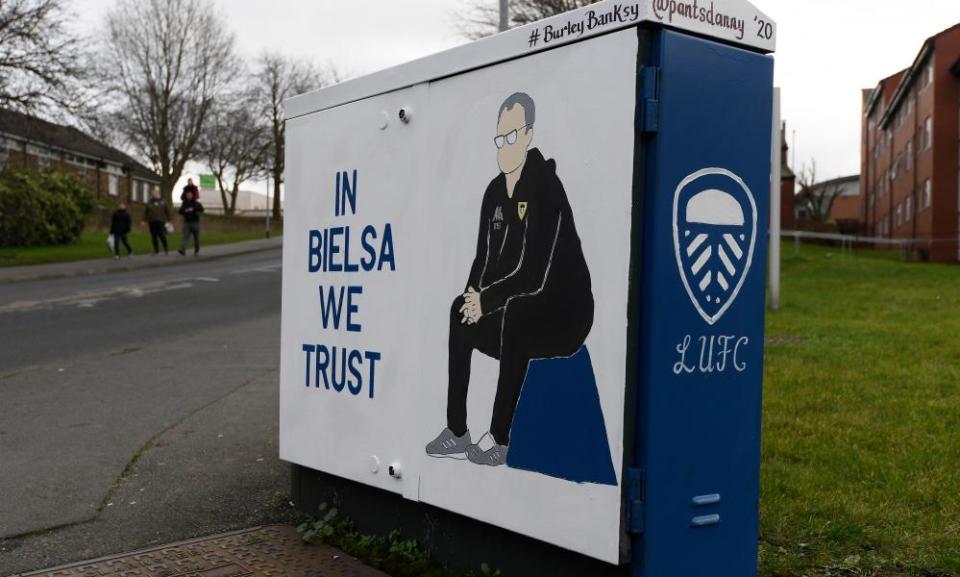Marcelo Bielsa’s first signs of Leeds fallibility is a test for fans’ devotion

The problem with any discussion of Marcelo Bielsa is the tendency immediately to speak in grand broadbrush terms; everybody already knows what they think about him. It’s the curse of our age that positions so rapidly become entrenched, even when it comes to the ostensibly trivial issue of how football should be played.
Nobody can ever simply question the way Ole Gunnar Solskjær structures a midfield or his organisation of the press or ask whether the inclusion of Cristiano Ronaldo might have made those issues worse, without immediately being cast as anti-Ole or anti-Manchester United, revelling in every goal conceded.
Related: Grealish and Sancho could be thriving if each were at the other’s club | Jonathan Wilson
It feels as though football exported a particularly blinkered tribalism to wider culture and has since accepted it back with added paranoia and conspiracy theory. (The most absurd recent example is the idea that to be sickened by Saudi human rights abuses is to participate in a decades-long hate campaign against the city of Newcastle. It’s difficult, isn’t it? Is it possible to be anti-torture without also being anti-Geordie?)
But, Bielsa. He has divided people everywhere he has been, which is perhaps inevitable given his idiosyncratic and messianic nature. On the one hand, the Argentinian is extremely down-to-earth, drinking coffee in Costa, eating in a local Italian restaurant, dressing in a club tracksuit, apparently unconcerned by anything outside football – and yet simultaneously extremely sensitive to the sport’s role in society and the importance clubs play in the local community.
There is an integrity and a humility to him. But at the same time, he is stubborn and demanding, idealistic and so sure of his own mind that he insists on, for instance, the training ground being redesigned to his specifications.

It’s easy to see why Leeds fans love him. Not only did he take them back to the Premier League after a 16-year absence, but he has given them a style and an identity. It’s not so much that he has made football fun, although he has certainly done that, as that he has given Leeds a team of which they can be proud.
They are not the first fans to feel that way about him. In 2015, four years after he had left the Chile job, I had to have some passport photos taken in Santiago. It turned out Bielsa had once used the shop I went to and so three walls of the studio were covered in tiny pictures of him, thousands of Bielsas staring at you like being trapped in the poster for Being John Malkovich. Why? “Because he is Bielsa.”
Related: Tim Krul gifts Rodrigo winner for Leeds against doomed-looking Norwich
But that level of devotion makes criticism difficult. The issue of fatigue dominated his first two seasons in the Championship. Leeds fans hated the suggestion that burnout had caused them to miss the automatic slots in his first season and even more the idea that the Covid shutdown facilitated promotion in his second.
The way Leeds finished last season, with one defeat in their final 11 games, would suggest they had a point. Yet the question was relevant: given Bielsa’s previous history, at Newell’s Old Boys and Marseille in particular, why was burnout not a factor? How has he adapted to avoid it? Sensitivities around the question mean it has never really been answered.
Set against that are those who see Bielsa as a hipster affectation, those frustrated by his reluctance or inability to conduct post-match interviews in the familiar English cliches, those who wonder just how great a manager can be when in 30 years he has won three Argentinian championships, Olympic gold and promotion with Leeds. Such is the factionalism of the modern world, Leeds fans probably aren’t wrong to believe that there are some who would like him to fail.
Which brings us to this season. Leeds went into the weekend fourth bottom of the Premier League, having won two of their first 10 games. They have failed to beat Burnley and Newcastle. This season looks like being a struggle against relegation. And that has led to claims that Bielsa has been worked out. The past couple of weeks have even brought wild suggestions that the 66-year-old should be replaced – ludicrous, perhaps, but serious enough for the club owner, Andrea Radrizzani, to feel the need to rebuff them after last Sunday’s win at Norwich.

Part of the problem is another recurring theme of the age, the need for constant growth or expansion. Having finished ninth last season, with the highest points total for a promoted side in two decades, where, realistically, was there for Leeds to go? Their wage bill remains one of the five lowest in the division (although that may change, bringing its own pressures, if the transfer of shares from Radrizzani to 49ers Enterprises goes on).
Leicester, who Leeds face on Sunday, have faced a similar problem: just because they have finished fifth in the past two seasons doesn’t mean that anything less than that is somehow failure. An extraordinary achievement one season shouldn’t make that the new par.
Where Leicester and Leeds have suffered this season is with injuries. Leeds are still without Patrick Bamford, Luke Ayling and Robin Koch, but have also been without Kalvin Phillips, Raphinha and Junior Firpo at times and that has had an effect.
The stereotypical criticism of a Bielsa side is that they are too attacking, but this season the problem has been at the other end: 10 goals in 10 games; to have conceded 17, eight of them in two games, is unremarkable.
As players return – and if Joe Gelhardt is as exciting as he appeared against Wolves – Leeds probably will rally. But it’s not unreasonable at this stage to raise doubts. After all, Bielsa is an exhausting figure and this is already the longest he has spent at any one club.
It has not been a great start to the season and he is not beyond reproach; the tendency to divide everybody into Frauds or Goats is corrosive to proper discussion.
But whatever happens in the rest of this season, Bielsa has been brilliant for Leeds and his time at the club a rare joy in a world that feels increasingly sick.

